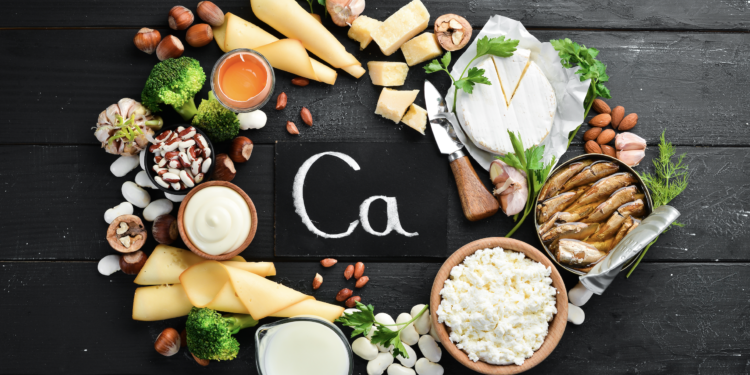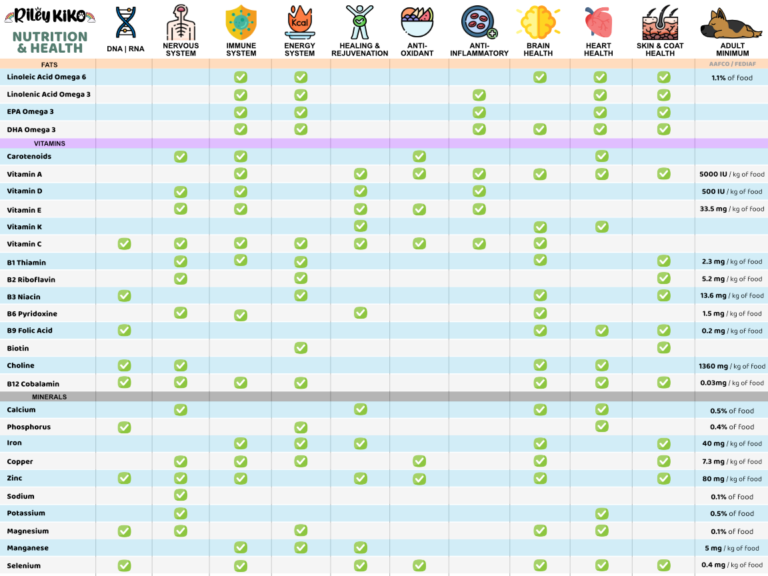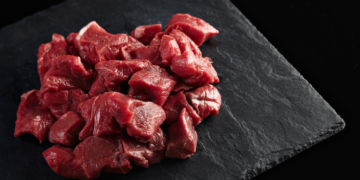IN SHORT
- focus on calcium, iron, copper and zinc as homemade diets are often lacking in calcium, iron and zinc
- deficiencies of magnesium, sulphur, manganese, iodine, selenium, potassium and sodium are uncommon in dogs
- high sodium levels are not of concern as dogs are resistant to salt retention and hypertension
- iron and copper toxicity can result from over supplementation
TIP
Food diversity & variety help minimise the possibility of deficiencies.
MORE ABOUT MINERALS FOR DOGS
- minerals are critical for many functions including activating enzymes, hormone production, DNA synthesis, wound healing and nerve impulse transmission
- dietary excess of iron, copper, manganese, iodine, sulphur, potassium, sodium and cobalt are unlikely
- calcium and phosphorus are grouped together because their functions are interrelated in the body
- likewise for iron and copper
MINERALS OF NOTE FOR DOG DIETS
- calcium, phosphorus and vitamin D interact in the maintenance of normal mineral status and skeletal integrity
- they work together in a delicate balance, and maintaining a proper calcium to phosphorus ratio is important for optimal health
- minimum calcium to phosphorus ratio of 1:1 should be present in diets
- too much phosphorus or fat in diets leads to reduced calcium absorption
- meat and organs are high in phosphorus and low in calcium
- diets with high proportions of muscles and organs meat can cause calcium deficiency
- diets with little to no meat can cause phosphorus deficiency
AAFCO recommends
- 0.5% of calcium per kg of food
- 0.4% of phosphorus per kg of food
TIP
- 1 gram of egg shells provides 400 milligrams of calcium
- anaemia as a result of a dietary deficiency of iron is extremely rare
- copper is needed for iron absorption and haemoglobin formation
- copper is the mineral most likely to cause toxicity as excess accumulate in the liver
- iron and copper toxicity can result from over supplementation
AAFCO recommends
- 40 milligrams of iron per kg of food
- 7.3 milligrams of copper per kg of food
TIP
- iron is widely found in most foods and organ meat
- organ meat, bran and germ portions of grains are good sources of copper
- necessary for proper functioning of immune system as well as taste and smell sensitivity
- zinc deficiency has been seen in dogs fed high cereal diets
AAFCO recommends
- 80 milligrams of zinc per kg of food
TIP
- oysters are a great source of zinc
Take a look at this chart to see the role minerals play in health:
Human grade supplements can be added. We look for individualised supplements in specific dosages rather than multi-vitamins.
If You Enjoyed Our Content
please consider buying us a coffee / sending us dog treats
Content Notice
Articles and videos are Informational only and not intended to replace professional veterinarian advice. Always consult a veterinarian or veterinary practitioner regarding your pet’s health and nutrition.




